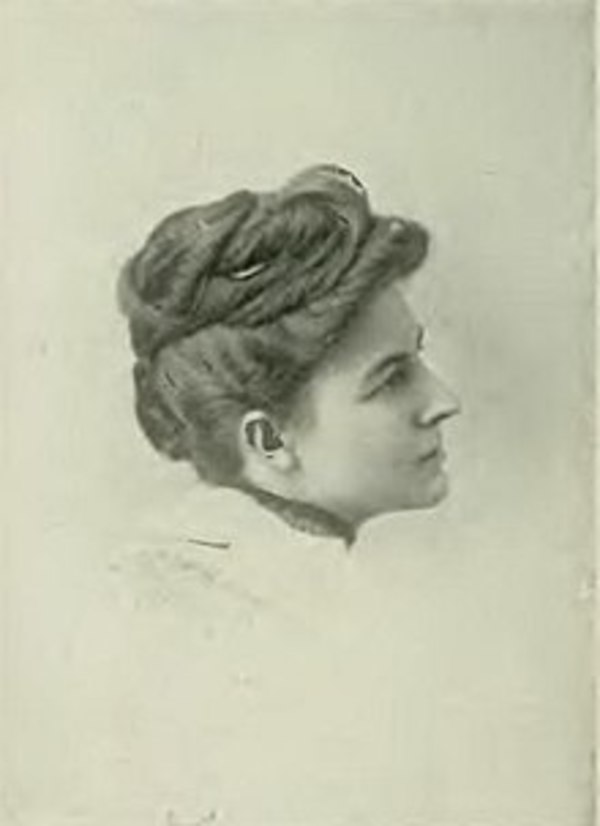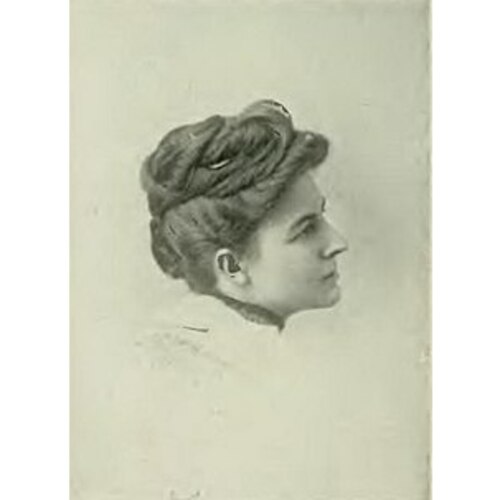
Source: Courtesy of Wikimedia Commons
FAIRBANKS, CONSTANCE (Piers), secretary, journalist, editor, stenographer, poet, and lecturer; b. 10 May 1866 in Dartmouth, N.S., daughter of Lewis Piers Fairbanks and Elizabeth (Ella) Ann Dewolfe; m. 7 Jan. 1901 Harry Piers in Halifax, and they had a son; d. there 17 Jan. 1939.
Constance Fairbanks was born into one of Nova Scotia’s oldest and most distinguished legal, mercantile, and political families. Her paternal grandfather, Charles Rufus Fairbanks*, had been master of the rolls and judge of the Vice-Admiralty Court; her father, Lewis Piers, was a civil engineer and the owner of the Shubenacadie Canal, a project begun by his father; and her paternal uncle, Samuel Prescott Fairbanks*, a former politician, was employed in the civil service. Because there were concerns about Constance’s health, she was schooled at home for the most part.
Although Fairbanks was seemingly destined for a refined existence, her father’s business reversals obliged her to work for a living, which was highly exceptional among daughters of the upper middle class. She was first employed in 1887 as secretary to Charles Frederick Fraser*, superintendent of the Halifax Asylum for the Blind, a position she held for three years. During this time she began writing for Fraser’s weekly newspaper the Critic, which by 1888 was advertising itself as “a Maritime provincial journal devoted to commerce, manufacturing, mining, and agriculture.” It was decidedly progressive in its editorial perspective and supported advanced causes such as women’s enfranchisement. In 1890 Fairbanks was named assistant editor and two years later she was promoted to managing editor.
As the Critic’s representative, Fairbanks attended the New England Woman’s Press Association convention in Boston in May 1890, an experience that made a deep impression on her. Like so many other Maritimers before and since, she decided to emigrate to the “Boston states,” which she did in 1893. She found employment in St Johnsbury, Vt, as associate editor of the Caledonian, a newspaper owned by a distant cousin, Arthur Fairbanks Stone. Her younger brother Kenneth was also working in St Johnsbury as a draftsman. The community, although small, had an enviable record of intellectual culture. One of the visiting itinerant speakers, the French humorist Paul Blouet (known by his pseudonym, Max O’Rell), had written in 1892: “Here are a dozen churches, a public library, reading room, museum, schools, and a lecture hall.… The town has only six thousand inhabitants, eleven hundred of whom came to hear me lecture tonight – where is the European town of six thousand that would supply an audience of eleven hundred people to a literary causerie?” Fairbanks was a supporter of women’s suffrage and may have been active in the St Johnsbury Woman’s Club, which had been organized in May 1892. It is not known when or why she left Vermont, but by 1898 she was back in Halifax. Loneliness or homesickness may have contributed to her decision to return, but at least part of her heart remained in New England: in February 1899 she would give a talk on the history and literary heritage of the town of Concord, Mass., to the Halifax Literary Society.
Fairbanks’s stint as associate editor of the Caledonian from 1893 to 1894 was the last-known phase of her career as a newspaperwoman. After returning to Halifax, she would probably have resumed her old post at the Critic had the paper not folded in 1896. Instead she made a living as a stenographer and became a freelance writer of prose and verse. Her first venture in literary editing had been made in collaboration with Harry Piers; in 1893 they had published Frankincense and myrrh, selections from the poems of the late Mrs. William Lawson, (M.J.K.L.) (Halifax), a 152-page book by Mary Jane Katzmann*, a local author who had likely been a mentor to Fairbanks. By 1896 Fairbanks’s own work was attracting favourable critical comment. In 1900 Theodore Harding Rand* included three of her poems in A treasury of Canadian verse, one of them titled “Halifax”:
Facing the ocean, guardian of our land,
Thy frowning forts and ramparts front the foam
Whose waves still ceaseless chafe the rocky strand,
While salt winds waft sea-odors o’er our home.
All the round year the tramp of armed men,
Crisp bugle call, the guns at noon and night,
And martial music, tell us o’er again
That Britain guards us with a jealous might.
Over the next four decades Fairbanks’s work would be published in several magazines in Canada and England.
In 1901, at age 34, Fairbanks married her former co-editor, Piers. He had recently been appointed deputy keeper of public records, curator of the Provincial Museum, and librarian of the Provincial Science Library. Fairbanks was a member of the Church of England, but in order to accommodate Piers, she agreed to a wedding solemnized by the Reverend John Forrest*, a minister of the Presbyterian Church in Canada and the president of Dalhousie University. Though Fairbanks no longer had to work for a living, she remained a stenographer for hire until the birth of her son in 1903. Her marriage to Piers enabled her to devote her life to promoting arts and letters and writing verse. She did much to foster dramatic productions in the Maritimes and would be active with the Theatre Arts Guild of Halifax. In 1905 she founded, with Kate Mackintosh* and others, the city’s Ladies’ Musical Club, and was its long-standing publicity secretary. A member of the executive of the provincial branch of the Canadian Authors Association (CAA) (along with her husband, who would also serve on the national council), she chaired the poetry contest and publication committee, overseeing the judging of the 1934 competition and publishing the best entries in An Acadian sheaf. Successful sales prompted another call for submissions the following year, resulting in a second volume that included prize-winners Egbert Chesley Allen*, Kathryn Munro, and Kenneth Leslie*. Fairbanks was also a member of the Poetry Society, which had been established in England in 1909. She wrote book reviews for the Dartmouth Patriot and music and drama criticism for the Halifax weekly the Acadian Recorder. In demand as a lecturer on musical, historical, and literary subjects, in March 1927 she gave a paper to the Nova Scotia Historical Society about Richard John Uniacke*’s country house at Mount Uniacke.
Although Fairbanks lacked a formal education, she was, as the obituary in the Canadian Author (Montreal, April 1939) would put it, “schooled in the rich tradition of the Acadian singers.” Not only did she read widely but she also sought to improve her literary craft through academic courses. In her own time she took herself, and was taken by others, seriously as a verse-writer, even if she was not in the same league as her aunt, Catherine (Cassie) Fairbanks, whose The lone house (Halifax, 1859) and The log of the sail of the Sailors’ Rest (Halifax, 1880s) are small gems of their genre. To become a great poet was Constance Fairbanks’s aspiration, not her achievement. As she wrote in 1936 to Martha Eugenie Perry of the Victoria and Islands branch of the CAA, “Though I can never hope to scale the heights of Parnassus, still I know that my writings have given more than just mere pleasure to some, and in that way perhaps are worth while.” A collection of her poetry, Christmas pie, would be published in 1938, the year before her death.
Fairbanks’s chief contribution to Canadian cultural life was as an early female journalist, editor, and reviewer – a promoter of writing rather than a significant producer of it. In Canadian men and women of the time (Toronto, 1912), Henry James Morgan*’s categorization of Fairbanks as a “litterateur” captures her essence perfectly: she was a literary person who substituted passionate enthusiasm and a disciplined intelligence for native talent and applied knowledge. If she had lived in a later era, she would have been viewed as an arts-and-culture maven. Artistic pursuits befitted and appealed to intellectually gifted women of the upper middle class from which Fairbanks had sprung. The Canadian Author obituary describes her as a “warm-hearted” and unfailingly kind person who had done much “to strengthen and sustain” the cause of the CAA. At its annual meeting and national convention held a few months after her death, Nathaniel Anketell Michael Benson*, managing editor of the Canadian Poetry Magazine, paid tribute to the memory of Fairbanks and others. As was noted in the October 1939 issue of the Canadian Author, he praised them for having “so loyally voiced their beliefs and their songs in our pages” and for having dedicated themselves to “this high cause of poetry.”
Constance Fairbanks (Piers) is the author of Christmas pie: selections from verses written for private greeting cards and calendars … (Halifax, 1938). For the Nova Scotia branch of the Canadian Authors Assoc., she co-edited An Acadian sheaf: selections from current Nova Scotian poetry (2v., Halifax, 1934–35), which includes some of her verses. Her poems “Halifax,” “The junction,” and “Those far-off fields” were published in A treasury of Canadian verse, with brief biographical notes, ed. T. H. Rand (Toronto and London, 1900; repr. Freeport, N.Y., 1969). Her poem “Quietude” is published in A new Canadian anthology, ed. Alan Creighton (Toronto, 1938). There is no comprehensive bibliography of Fairbanks’s verse, which appeared in several periodicals and newspapers, including Canadian Homes and Gardens, Canadian Magazine, Canadian Poetry Magazine, Crucible, Saturday Night, and the Week (all published in Toronto); Poetry of To-day: the Poetry Review New Verse Supplement and Poetry Review (both published in London); and the Montreal publication Poetry Year Book. The whereabouts of her papers, willed to her son, Edward Stanyan Fairbanks Piers (1903–71), is unknown. The holograph of her unpublished paper “Mount Uniacke: an old colonial mansion and its historic heirlooms” is held at NSA, MG 20, vol.676 (Nova Scotia Hist. Soc.), item 1. Some of her correspondence, as well as a scrapbook (which makes clear her fascination with the New England origins and contemporary connections of the Fairbanks family), is among the papers of her husband at NSA, MG 1, vols.753–58, 758A, 1046–51, 1153A, 1464–66 (Harry Piers fonds).
BCA, MS-0697 (Martha Eugene Perry papers). Halifax County Court of Probate (Halifax), Estate papers, no.14929. NSA, MG 20, vols.1–3 (Canadian Authors Assoc., Nova Scotia branch), and vols.183, 183A, 184 (Halifax Ladies Musical Club). Acadian Recorder (Halifax), 1901–30. Caledonian (St Johnsbury, Vt), 1893–[98?]. Critic (Halifax), 1890–94. Dartmouth Patriot (Dartmouth, N.S.), 1901–39. C. H. Fairbanks, Fairbanks family record (Cleveland, Ohio, 1886). R. J. Long, Nova Scotia authors and their work: a bibliography of the province (East Orange, N.J., 1918). Thomas O’Hagan, “Some Canadian women writers,” Catholic World (New York), 63 (April–September 1896): 779–95. Simon Fraser Univ. Library, “SFU digitized collections,” Canada’s early women writers, Piers, Constance Fairbanks: digital.lib.sfu.ca/ceww-747/piers-constance-fairbanks (consulted 20 Sept. 2016). Who was who among North American authors: 1921–1939 (2v., Detroit, 1976), 2. Woman’s who’s who of America: a biographical dictionary of contemporary women of the United States and Canada, 1914–1915, ed. J. W. Leonard (New York, 1914; repr. Detroit, 1976).
Cite This Article
Barry Cahill, “FAIRBANKS, CONSTANCE (Piers),” in Dictionary of Canadian Biography, vol. 16, University of Toronto/Université Laval, 2003–, accessed January 1, 2026, https://www.biographi.ca/en/bio/fairbanks_constance_16E.html.
The citation above shows the format for footnotes and endnotes according to the Chicago manual of style (16th edition). Information to be used in other citation formats:
| Permalink: | https://www.biographi.ca/en/bio/fairbanks_constance_16E.html |
| Author of Article: | Barry Cahill |
| Title of Article: | FAIRBANKS, CONSTANCE (Piers) |
| Publication Name: | Dictionary of Canadian Biography, vol. 16 |
| Publisher: | University of Toronto/Université Laval |
| Year of publication: | 2019 |
| Year of revision: | 2019 |
| Access Date: | January 1, 2026 |



